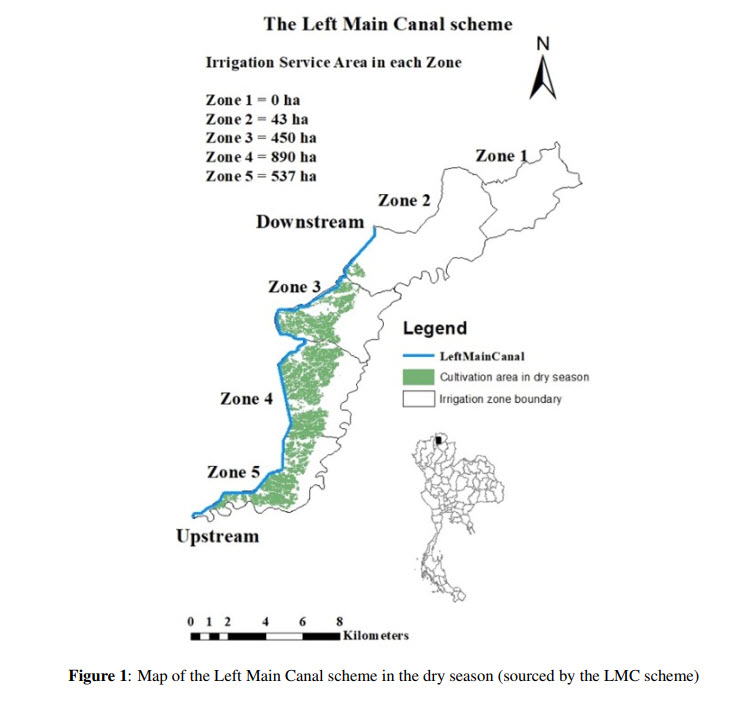Participatory Multi Criteria Decision Making for Irrigation Management in the Left Main Canal Scheme in Dry Season, Chiang Rai Province, Thailand
Main Article Content
Abstract
This study aims to investigate appropriate alternative options for participatory multicriteria decision making for the participatory irrigation management in dry season and to discuss relevant actors affect to attitudes for relevant alternative options in participatory irrigation management in the dry season by relevant key stake holders at the Mae Lao irrigation scheme (MLIS), Chiang Rai province in the total irrigated area as 1,920 ha. Under the Participatory irrigation management (PIM), promoted by the Thai royal irrigation department (RID), has supposed to co-operate among relevant stakeholders in irrigation management. In this study, the participatory multi criteria decision-making (PMCDM), based on the analytical hierarchy process (AHP) by relevant key stakeholders (11 government staffs and 22 water user members), was used as a decision rule for decision-making (DM) in prioritizing alternative options for irrigation management. Under domains of irrigation system (technic, irrigated agriculture, institution and budget domains), relevant multiple criteria and alternative options were generated and weighted with relevant criterion scores and alternative solution scores for irrigation management in the decision-making process, conducted by a focus group with an expert facilitator via participatory methods with relevant key stakeholders in the study area. The results concluded that the financial budget criterion in the budget domain has the highest weighted criteria score for decision making and establishing the local irrigation budget and reforming institutional irrigation are the first and the second ranked alternative solutions by relevant key stake holders. Moreover, the result of sensitivity analysis of the criteria showed that two criteria (institutional transparency and financial budget) in two domains (institutional and budget domain, respectively) are the most sensitive for decision making. And the participants’ attitudes toward alternative solutions show that relevant status, roles their responsibilities and irrigational knowledges of participants affected to the point of views on positive and negative attitudes on all alternative solution for participatory irrigation management in the study area.
Article Details

This work is licensed under a Creative Commons Attribution-NonCommercial-NoDerivatives 4.0 International License.
References
Andersen, D and G., Richardson. 1997. Scripts for group model building. Syst. Dyn. Rev. 13 (2), p. 107-129.
Antunes, P., V. Karadzic, R. Santos, P. Beca and A. Osann. 2011. Participatory multi-criteria analysis of irrigation management alternatives: The Case of the Caia irrigation district, Portugal. International Journal of Agricultural Sustainability 9 (2): 334–349. 13
Bots, P.W. and C.E., van Daalen. 2008. Participatory model construction and model use in natural resource management: a framework for reflection. Syst. Pract. Action Res. 21 (6), 389-407.
Cavestro, L. 2003. (P.R.A) Participatory Rural Appraisal Concepts Methodologies and Techniques. M.A. Thesis. Universita degli Studi di Padova, Padova. 38 p.
Chambers, R. 1988. Managing canal irrigation: Practical Analysis from South Asia. Cambridge University Press, 279 p.
Chittaladakorn, S. 2013. Decision Support System for Water Resources Engineering Management. Kasetsart Publishing Press, Bangkok. Thailand. 503 p. (in Thai)
Gamboa, G. and G. Munda. 2007. The problem of windfarm location: A social multi-criteria evaluation framework. Energy Policy. 35: 1564-1583.
Hare, M. 2011. Forms of Participatory Modeling and Its Potential for Widespread Adoption in the Water Sector. Environmental Policy and Governance. 21(6): 386-402.
Heuer, R.J. 1999. Psychology of Intelligence Analysis. Central Intelligence Agency, Mclean, Virginia. 184 p.
Huber, G.P. 1980. Managerial Decision Making (Management Applications Series). Scott Foresman and Company, Glenview, Illinois. 229 p.
Hwang, C.L. and K. Yoon. 1981. Multi attribute decision making: methods and applications. Springer-Verlag, Berlin. 269 p.
Parnell, G.S., P.J. Driscoll, and D.L. Henderson. 2011. Decision Making in Systems Engineering and Management. John Wiley and Sons, Hoboken. New Jersey. 497 p.
Pitz G.F. and J. McKillip. 1984. Decision Analysis for Program Evaluators. SAGE Publications, Thousand Oaks, California. 304 p.
Saaty, T.L. 1980. The Analytic Hierarchy Process. McGraw-Hill, New York.
Schoemaker, J.E. and P. Russo. 1989. Decision Traps: Bantam Doubleday Dell Publishing Group, New York.
Small, L.E. and M. Svendsen. 1992. A Framework for Assessing Irrigation Performance. International Food Policy Research Institute, Washington, D.C. 38 p.
Starr, M.K. and M. Zeleny. 1977. MCDM: State and future of the arts. pp 5-29 In: M.K. Starr, M.K. and M. Zeleny (eds.). Multi criteria Decision Making: Studies in Management Sciences. North-Holland Publishing Company. Amsterdam.
Thungngern, J., S. Wijitkosum, T. Sriburi and C. Sukhsri. 2015. A review of the analytical hierarchy process (AHP): An approach to water resource management in Thailand. Applied Environmental Research 37(3):13-32.
Triantaphyllou, E. and A. Sánchez. 1997. A sensitivity analysis approach for some deterministic multi-criteria decision-making methods. Decision Sciences 28(1): 151-194.
Van den Belt, M. 2004. Mediated Modeling: A System Dynamics Approach to Environmental Consensus Building. Island press.
Voinov, A., and E.J.B., Gaddis. 2008. Lessons for successful participatory watershed modeling: a perspective from modeling practitioners. Ecol. Model. 216 (2), 197- 207.
Wongprasittiporn, C. 2005. Large rice-based irrigation systems in Thailand. Country paper No.7. In: Proceedings of the Regional Workshop on the Future of Large Rice-Based Irrigation Systems in Southeast Asia. FAO Regional Office for Asia and the Pacific. Bangkok.
Wongprasittiporn, C. 2007. The future of Large Rice-based Irrigation System in Southeast Asia [Large rice-based irrigation systems in Thailand]. Water Resources Development and Conservation Officer FAO Regional Office for Asia and the Pacific. Bangkok. Thailand.
Wongtragoon U, Kubo N, and H. Tanji.2009. Performance diagnosis of Mae Lao Irrigation Scheme in Thailand. (I) Development of unsteady irrigation water distribution and consumption model. Paddy Water Environ, 8(1): 1-13


